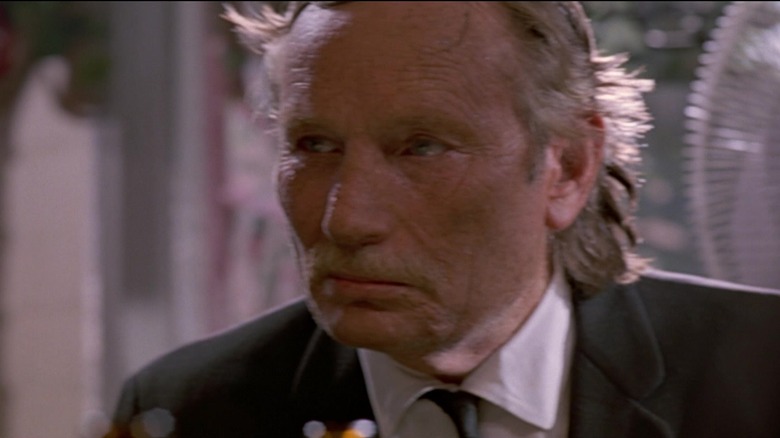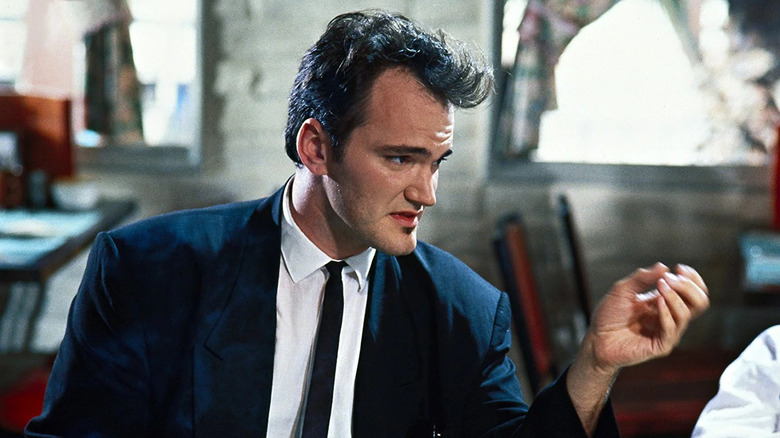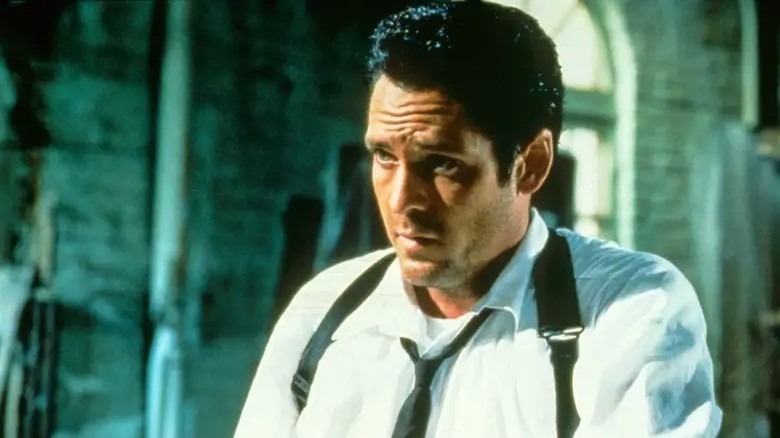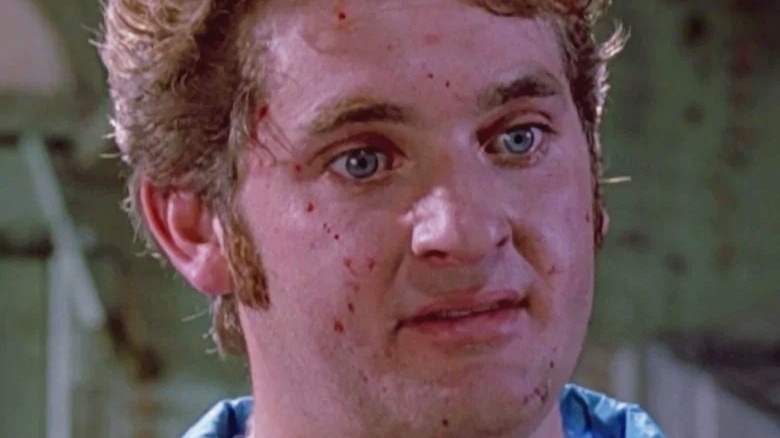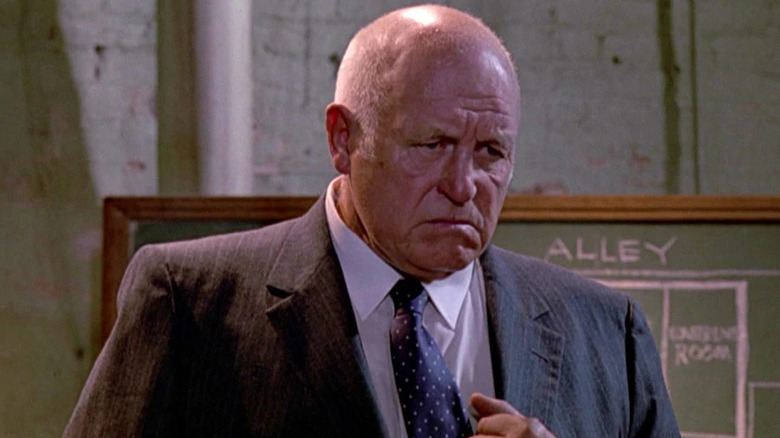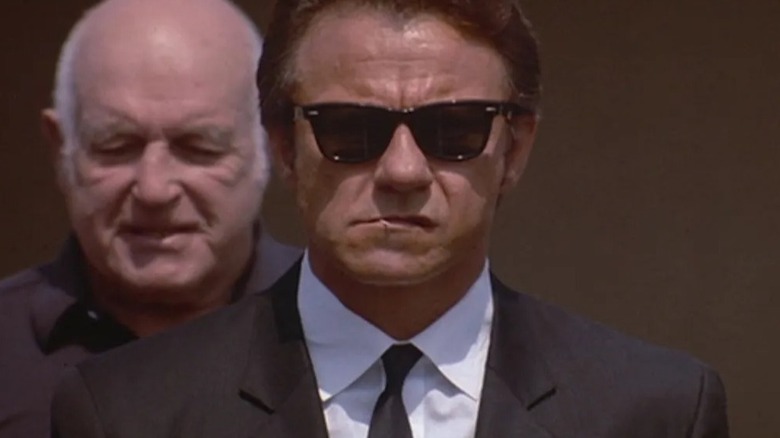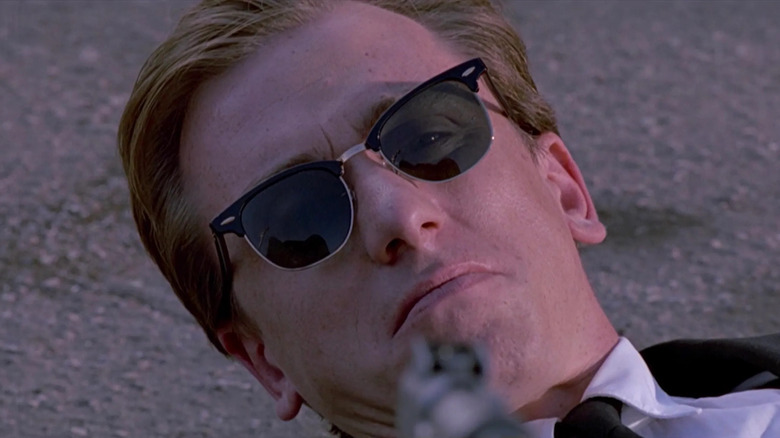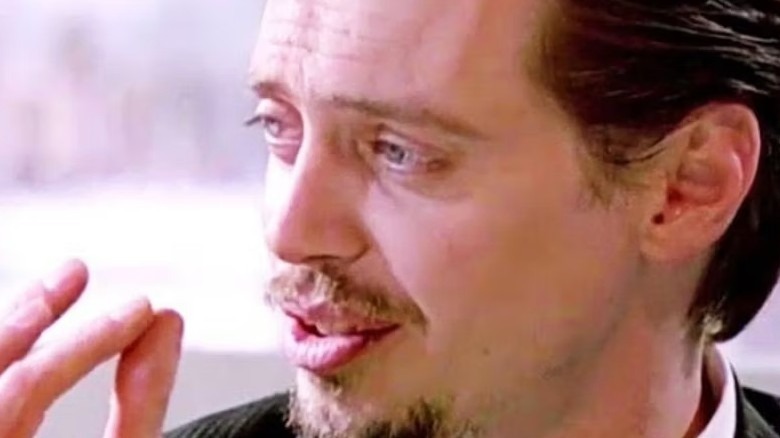Every Main Character In Reservoir Dogs Ranked Worst To Best
Writer-director Quentin Tarantino's feature-length debut, "Reservoir Dogs," follows a group of criminals who try to identify the rat within their ranks after their attempted heist goes horribly wrong, and then gets much worse. Following its premiere at the 1992 Sundance Film Festival, "Reservoir Dogs" earned widespread critical praise, paving the way for Tarantino to reach even loftier heights with "Pulp Fiction." Today, it's considered one of the best and most influential independent films ever made.
The crime drama follows the colorfully named cast — Mr. Blue, Mr. White, etc. — as they slowly unravel due to stress and paranoia. That someone in the crew betrayed them is beyond a doubt. The question is, who? Harvey Keitel anchors the ensemble as the steady Mr. White, a seasoned crook and the closest thing to a decent person among them. But none of them are actually good — at one point, White nonchalantly discusses how best to administer pain to get bank employees to comply. They are scoundrels but are fascinating characters. We've sorted them all from worst to best.
8. Mr. Blue
Of all the film's colorfully named characters, Mr. Blue (Edward Bunker) gets the least amount of screen time. He's in the introductory diner scene. We briefly glimpse him during the group's iconic slow-motion walk in their suits and sunglasses. And he takes part in the pre-heist planning. That's it. He's not even killed on-screen!
This is a true pity, as Mr. Blue has one of the most offhandedly funny lines of the entire film. As the group sits around the diner table debating Madonna's music, Mr. Blue interjects with his opinion on the matter. "When she got into that 'Papa Don't Preach' phase, I tuned out." What really dials up the humor is the visual of Mr. Blue — a salty old crook — enjoying Madonna's music at all. Adding to this contrast is the fact that this criminal's personality is anchored by real-world experience. Edward Bunker was a convicted felon (via The Independent) and had served time for bank robbery, among other things. Maybe he should've been in charge of the planning.
7. Mr. Brown
Similar to Mr. Blue, Mr. Brown (Quentin Tarantino) only gets a handful of scenes. However, he has plenty of dialogue. His monologue about the meaning behind Madonna's "Like a Virgin" is probably one of the movie's most memorable scenes. But it feels an awful lot like Stephen King inserting himself in the "Dark Tower" novels: a little too cutesy, a little too self-involved, and way too long.
Since "Reservoir Dogs" was Tarantino's first major film, we'll forgive the directorial faux pas and enjoy the scene for what it is. Like Mr. Blue, Mr. Brown is killed off-screen. Our final glimpse of the motormouth occurs between the blow that kills him and his actual death. Mr. Brown drifts into frame, crashing the getaway vehicle into a parked car. He's been shot in the head and can't see, and he dies while Mr. White deals with the cops. Brown's quiet death is in sharp contrast to the flamboyance with which he lived.
6. Mr. Blonde
Vic Vega, aka Mr. Blonde (Michael Madsen), exudes cool. It's in the way he blows smoke rings while acting vaguely amused by the rambling discussion at the diner. It's in his utter nonchalance as he sips a soda while Mr. White and Mr. Pink (Steve Buscemi) are at each other's throats after the heist implodes. It's in the way he wears his suit and sunglasses. He just looks cool. But underneath that chill exterior is an even colder heart. Mr. Blonde is a freaking psychopath.
We get a hint of this as Mr. White and Mr. Pink compare notes about when and where the heist went wrong, and agree that it was when Mr. Blonde started shooting people. We're not convinced yet, in part because the film is masterfully constructed to make us question everything. We're in the dark about what happened and are left piecing together the story by what is said after the fact, but even then we can't be entirely sure. The characters themselves aren't entirely sure! "Reservoir Dogs" is a case study in the difference between perception and reality, and how one often becomes the other.
But we learn who Mr. Blonde is with absolute certainty. After he's left alone with a cop he took hostage, Blonde starts torturing him with a razor blade. No questions, just pain, just because he wants to.
5. Nice Guy Eddie Cabot
Nice Guy Eddie Cabot (Chris Penn) is really hard to take seriously. First of all, there's his nickname, "Nice Guy." In all likelihood, it's probably a misnomer, like calling a big man "Tiny." Eddie seems affable enough, and he acts like a big kid most of the time. Penn himself could be kind of a goof, which seals that impression. And Eddie's tendency to wear blue and purple tracksuits doesn't inspire much confidence. Also, he calls his father, Joe Cabot (Lawrence Tierney), "Daddy," despite the fact that he's at least 30 years old.
But when the crap hits the fan and the bloodied thieves are spiraling out of control, it's Eddie that snaps them out of it. He comes up with the plan to get rid of the extra cars and retrieve the hidden diamonds. His steady hand keeps the train on the tracks. If only he hadn't left his old buddy Mr. Blonde alone in the warehouse, maybe things would've been different.
Above all, Eddie is unfailingly loyal to his old man. Mr. White drawing a gun on Joe Cabot might've presented a promotion opportunity if Eddie was willing to take it. Instead, it turns into a 4-way shootout.
4. Joe Cabot
Joe Cabot is the bloated spider at the center of this web. We never get the particulars of his organization, but the mere fact that he has an organization probably tells us all we need to know. He's a no-nonsense mafia type. When he barks, people listen. Prior to the heist, Cabot dresses the team down because they aren't taking the job seriously enough. Everyone, even Mr. Blonde and Mr. Brown, shut up and give him their rapt attention. It's through the way these criminals act around Cabot, and the obvious respect they afford him, that we come to appreciate that he's kind of a big deal.
This fact is later confirmed by Mr. Orange (Tim Roth). The cops laid a trap and are waiting for Cabot to show up before they come in kicking down doors. The thieves are immaterial and hardly worth bothering with by comparison. Speaking of Mr. Orange — he notably compares Cabot to The Thing from Marvel's "Fantastic Four." You can't unsee it. I was just hoping he'd say "it's clobbering time" once in the film. Alas.
3. Mr. White
Mr. White is the closest thing we have to a main character in the ensemble film. Played with cool confidence by Keitel, it's almost impossible not to like him. He's an old pro, but he's not jaded by the game. He's still compassionate, as we see in his concern for a stomach-shot Mr. Orange. But he's also a tough guy. He doesn't take scruff from either Mr. Blonde or Mr. Pink.
Unfortunately, Mr. White is a bit of a doofus. He doesn't realize they had been set up until Mr. Pink points it out. He tells Mr. Orange — a man he's known all of a few days — his name and enough about his background that it would be easy to determine his real identity. And then, most damning of all, he sides with Mr. Orange over his long-time friend and business associate Joe Cabot. Full marks to Mr. White for taking Mr. Orange under his wing and all, but sheesh. What a moron. It's a wonder this guy was walking around free at all. Mr. Blue never would've made such a mistake.
2. Mr. Orange
The most remarkable thing about Mr. Orange is how good of an undercover cop he is. The fact that he is a cop at all is one of the film's highlights. The rat that everyone has been searching for turns out to be the guy in plain sight bleeding out all over the floor. We honestly forget he's even there once Mr. Blonde commences with his torture of the cop. But he rouses long enough to put Blonde down like the dog he is. It's a moment worth cheering for in an otherwise dour film.
However, it is how masterfully he infiltrates the group that merits this ranking. The scene of Mr. Orange narrating his criminal anecdote to Joe Cabot, Eddie Cabot, and Mr. White is so well done, we're tempted to believe him even though we know he's a cop. It's easy to shake our heads at Mr. White's naivety, but I don't think we would've managed any better.
1. Mr. Pink
We are inclined to dislike Mr. Pink practically from the start. Everyone at the diner but Pink kicks in a dollar to tip the waitress. As he explains it, he doesn't like rewarding people for what should be their job. The other criminals are a bit incensed — well, except the psychopath, Mr. Blonde. We come away knowing one thing for certain: Mr. Pink is a cheapskate, and thus, maybe a bit untrustworthy. It helps, too, that Buscemi brings an oily sneer to the role. Later, when it becomes clear the group was set up, we are naturally inclined to blame Mr. Pink, even though he's the one pointing out that they'd been set up! It's a clever bit of character play from writer-director Tarantino.
But after that rough introduction, and amid the heist's bloody aftermath, Mr. Pink is the only sensible man in the bunch. He's forever trying to reign in the others, to get them to act like the professionals they are supposed to be, but he's the only true professional among them. The rest of them are brought down by making things personal, which is why Mr. Pink ends up the last man standing. Although, given the gunshots that ring out after he flees the warehouse, that probably doesn't last very long.

